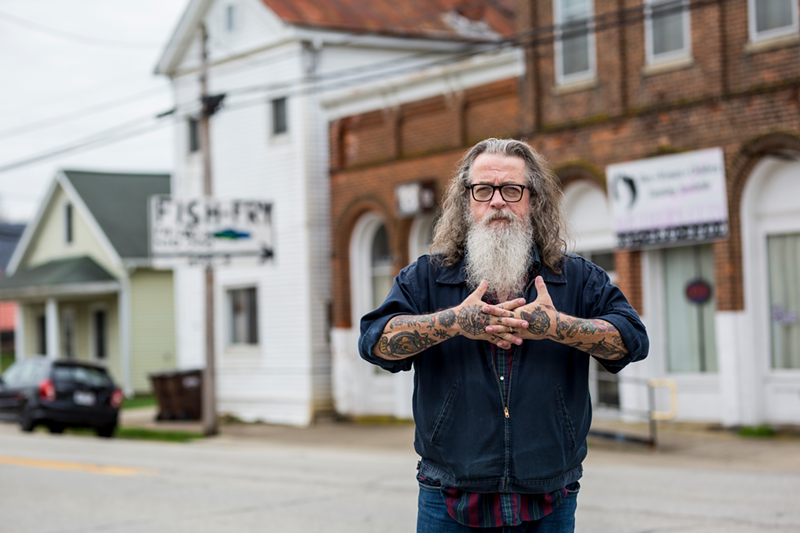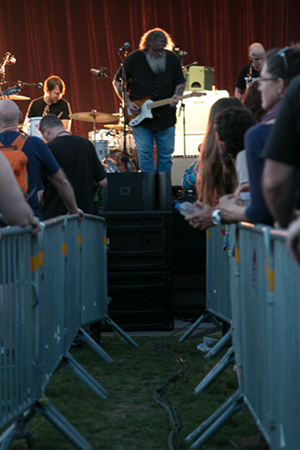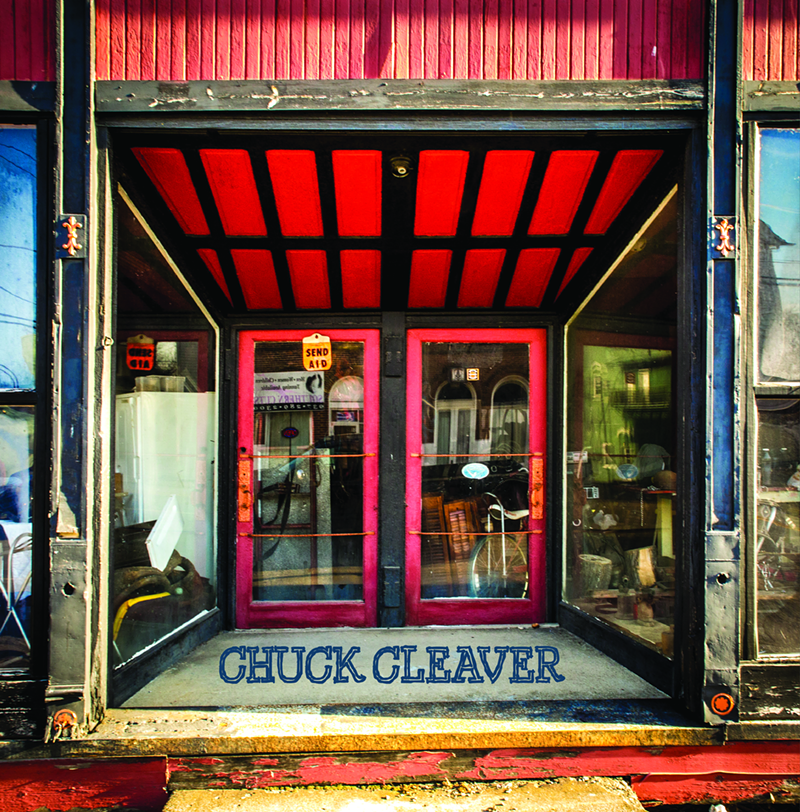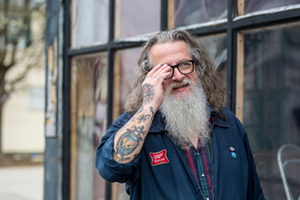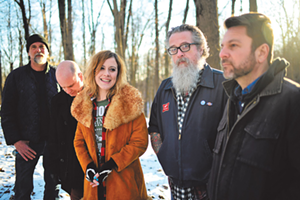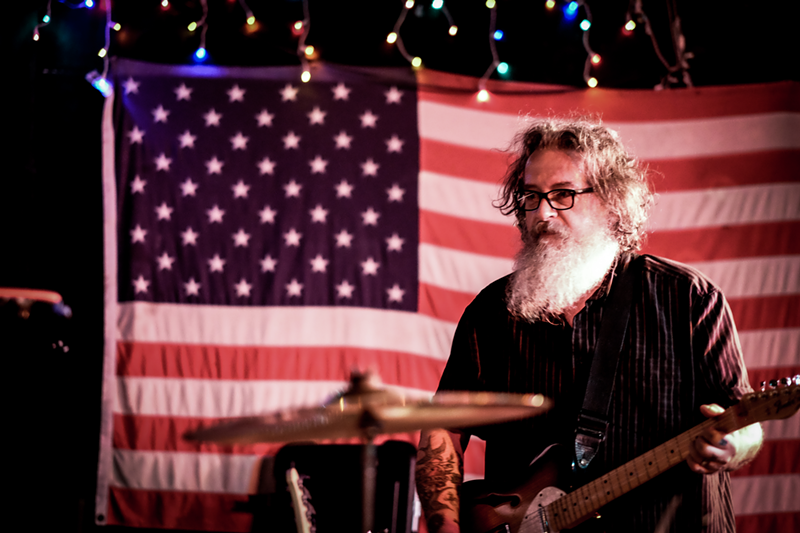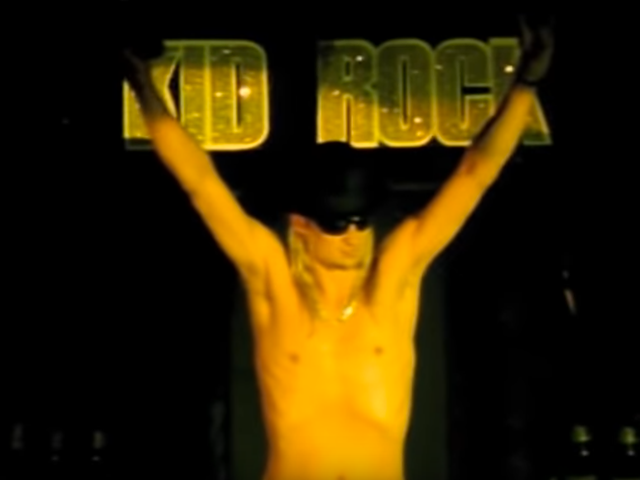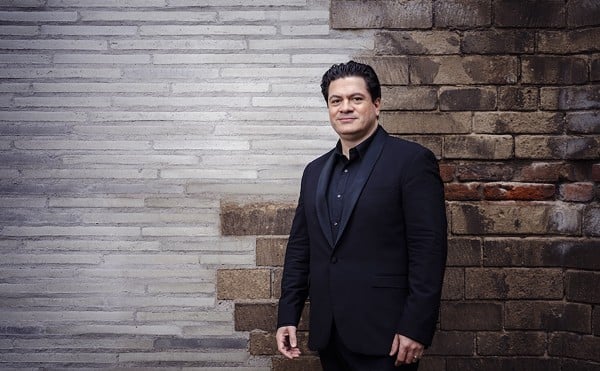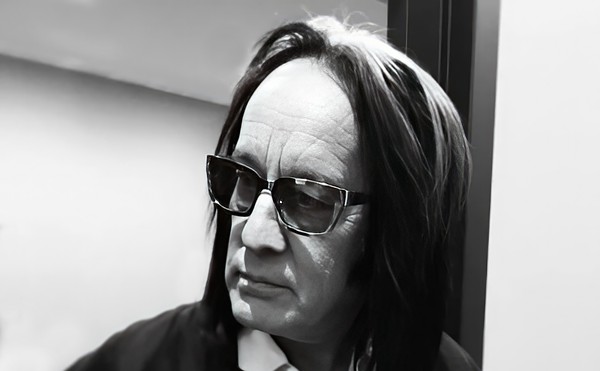Chuck Cleaver is persistently and unfailingly self-deprecating. In the mutative, spider-bitten Marvel Universe, it could be considered his superpower, as he deflects praise with an ursine growl and a dismissive wave of his paw.
“I always quote R. Crumb,” he says, “it's just lines on paper."
Despite being one of the most acclaimed singer/songwriters to ever emerge from the Cincinnati music scene, this has been his tactic since his first band of note, Ass Ponys, trembled on the edge of some form of stardom in the 1990s. It has continued through his decade-and-a-half-long tenure as co-frontperson of Rock band Wussy. And it will likely characterize the promotion of Send Aid, his first solo album after a give-or-take 40-year career in music.
OK, maybe “career” isn’t the best word, at least in Cleaver’s opinion. He’s not comfortable with the idea of identifying what he's been doing all this time as some sort of “profession.”
“I don't consider what I have as a career,” he says without a trace of irony. “I think it's a passion that sort of went haywire.”
The only thing more unlikely than Cleaver's band life is his solo work, which begins with the release of Send Aid on July 19. He has always been content to display his songwriting and performing acumen through his notable band affiliations, and the idea of seeing his own name on an album has been uncomfortable at best, abhorrent at worst.
But against all odds, Cleaver has caved in to peer pressure.
"Billy Carter from (Cincinnati-based record store/label) Shake It has been on me for years,” he says. “(Shake It founder) Darren (Blase) has suggested it — other people, too. I just like working with a band. It's my natural habitat.”
Even though Send Aid (which is being released through Shake It, also the label home of every Wussy album) has Cleaver’s name on it, the album was recorded with a loose, band-like collective of Cincinnati musicians from various local groups.
“It was a fun record to make,” Cleaver says. “There are people from Vacation and Mardou and Lung and Swim Team and Dawg Yawp, and some of Wussy is on there. We were going to make up a band name; I think we were going to call it The Also Rans. I pitched it to the guys at Shake It and they were like, 'Pussy, call it by your own name. Quit being a dink and own it.' ”
“I just do stuff and sometimes it turns out”
It’s fair to say that Ass Ponys Chuck Cleaver is not startlingly different from Wussy Chuck Cleaver, and solo Chuck Cleaver follows that same general pattern — lightly twangy, fairly slanted and penetratingly offbeat Indie Rock that leaves a mark. He understands the qualities that link all of those creative personas, but he also understands what differentiates them from one another: an elevation in his guitar technique; his improvement as a singer; his constant pursuit of a higher standard of songwriting.
But in some ways, Send Aid represents Cleaver rolling back the clock to a time when he did whatever he wanted musically.
“If you take the stranger aspects of Wussy and ramp them up to 100, you’ve got my solo record,” he says. “This record is probably going to remind people more of the Ass Ponys than Wussy, to tell you the truth. What interests me are words and shitty sounding records.”
Cleaver says longtime producer and colleague John Curley (also bassist for The Afghan Whigs, peers who once covered the Ass Ponys’ “Mr. Superlove”) has told him that if it were up to Cleaver alone, all of his albums would sound like they were “recorded in a tin can.”“Thank goodness there are other people in the band who prevailed,” Cleaver deadpans.
Clocking in at a crisp 27 minutes and featuring songs that individually average around two minutes, Send Aid hearkens back to Rock’s earliest days, when a new Beatles album was typically 14 or so minutes per side. It’s a concrete example of Cleaver’s love of both brevity and simplicity as well as his loathing of specific songwriting pitfalls.
“I don’t like clumsy phrasing and putting an accent where it doesn’t belong. That bugs the shit out of me,” he says. “The one that always comes to mind in a song I really love is Jefferson Airplane’s ‘White Rabbit’ — I can’t stand the ‘hookah-smoking caterpillar’ line. It’s too goddamn many syllables. I understand you want to get that imagery in there but, goddamn, find another way.
“I like my songs to be really compact. There are no long songs on the new record. There are songs that are less than two minutes. I like that economy. Say it and get it over with.”
One of Send Aid’s great moments in that regard comes on the album’s lead track, the short and shambling electric Folk ode “Terrible Friend,” which offers further evidence of Cleaver’s gift of wordplay with its opening volley: “If it looks like a mountain, it’s probably a mountain/If it looks like a hole, it’s probably a hole.” It’s a line that could be construed as a political observation.
“There are a lot of veiled political statements on the album,” Cleaver says. “These are some trying times, but I maintain that it’s probably magnified by the internet. There have been times that were just as trying, if not worse, and we just didn’t know about it.”
Before anyone gets the impression that Send Aid is somehow Cleaver’s great philosophical manifesto, consisting of songs he’s been secretly laboring over in his writing garret for decades, he’s quick to note that most of these new songs were originally written for Wussy and deemed by him to not be right for the band. He wrote the remaining songs to fit the tone of the album as it was shaping up.
“I took the ones I thought would work the best and then I wrote others to fill the gaps,” Cleaver says. “I don’t think a lot about that kind of stuff. I just write. Most of it’s kind of downtrodden because that’s where my head is most of the time. I’m not bi-polar; I’m just depressed. I have never had a plan, never once. I don’t dream. I dream at night, but I’m not one of those ‘I’m going to climb Mount Everest.’ I just do stuff and sometimes it turns out.”
What is evident throughout Send Aid is Cleaver’s masterful ability to extract high drama and poignancy from life’s overarching banality. “Anything” is a soundtrack to doomed relationships. “Bed” is a rumination on the fleeting nature of life. “The Weekend That It Happened” is compelling crime fiction. And it all unfolds in less that 30 minutes.
That briskness was reflected in the brief time it took to create the album. “The last Wussy album took us almost two years,” Cleaver says. “This record took about three weeks.”
Recorded mostly in the basement below the space that formerly held Northside vintage clothing and campy curiosities shop Chicken Lays an Egg, Cleaver then tweaked and mixed the tracks at Curley’s Ultrasuede studio. He credits engineer/producer John Hoffman for helping to get the kind of sound for which he so often has strived.
“I don’t know the specifics of this, but (Hoffman) ran the entire mix through a cassette deck and got that (makes garbled tape drag sound) and I love that,” Cleaver says.
“That was the step I was sitting on the morning I found the dead guy”
The album’s cover image, taken by Cleaver’s daughter, Anna Stockton, time-machined Cleaver back to his childhood in tiny Clarksville, Ohio, long before the idea of making music was even a remote possibility. The photo of a storefront from his hometown also conjured up a memory from his teenage years that will remain lodged in his head for the rest of his life.
“Anna went to my hometown and took a bunch of pictures and sent a bunch to me, and the very first one in the folder was the picture that’s on the cover,” Cleaver says. “And I was like, ‘Anna, that was the step I was sitting on the morning I found the dead guy,’ and she was like, ‘Aw, no way!’ ”
Cleaver then spins the tale with the kind of somewhat dark, somewhat folksy eccentricity that has been a trademark of his songwriting since the Ass Ponys days.
“I was sitting on that step, waiting for the bus to take me to high school out in the country,” he says. “That (storefront) was a used furniture store at the time, and the woman that owned it came out and said, ‘Hey, could you go up the street and check on this guy?’ He was our former town barber. I went up the street and found him dead. He was laying in bed, eyes wide open, looking at me. His arms were up in the brass railing of his headboard, he was bloated and he’d turned gray. And no amount of anything makes (that image) leave.”
The album’s title came from the same photograph. As far back as Cleaver remembers, whatever commercial operation has been installed in that storefront, there’s been a small sign nailed to the top of the left-side door that reads “Send Aid.” Whatever it was originally meant to convey is lost in the fog of time, but Cleaver saw it as the perfect banner for the album.
“It all happened the way I love things to happen,” he says. “It was just happenstance. Boom, there’s the cover. Boom, ‘Send Aid,’ there’s the title. Boom, done.”
For her part, Stockton knew the tale of her father’s corpse adventure well but had no idea she was documenting the spot where the story began. She also shot the back cover, a photo of the reputedly haunted Valley Steel Mill. Stockton had decided to shoot in Clarksville as part of her ongoing fine art photo series, Lohio: Things We’ve Loved and Lost, christened after the title of Ass Ponys’ final release, 2001’s Lohio. (You can view the photos at annastocktonphoto.com.)“I went there February of last year because my grandparents lived there and my dad grew up there, and I live 15 minutes away. My kids go to school in that district, the same place my dad graduated from,” Stockton says. “I had a few things in mind that I wanted to photograph, but that building wasn’t one of them, but as I was driving along, I decided to stop and shoot that one. I knew the story, it’s part of family lore, but I wasn’t aware it was that stoop he was sitting on. I just thought it was visually interesting, and the ‘Send Aid’ thing on the door, because that town looks like a bomb went off.”
Stockton shares Cleaver’s wry sense of humor and incisive wit. When asked about her perception of her father as a musical entity in his early days, her response could have been scripted by the old man himself.
“Sure, I didn’t live under a rock. I sort of knew what was going on,” she says. “At the same time, he was just my dad, eating cereal in his underpants. He was never this figure that he was to other people. I respected his talent and knew he was something cool. And it got me a lot of cool kid cred in middle school, because he had signed to A&M (Records) and they had a video on MTV. I went from being a dork to being relatively cool within that time frame. I stopped loving marine mammals and discovered Nirvana and became cool and so did everybody else. It was a pivotal time. It worked out really well for me to have my dad in the music industry. That was a score for a 12-year-old.”
“I’m pretty sure I was a mistake”
Cleaver’s own childhood in Clarksville was relatively idyllic by his account. By the time he started school, his brother and sister, 15 and 13 years his senior, respectively, were out of the house and he had the run of the place.
“My parents were never overabundant with praise, but they never put me down,” Cleaver says. “I’m pretty sure I was a mistake. My brother and sister always insisted, ‘God, you got to do whatever you wanted.’ And I was like, ‘Yeah, they were old and tired by then.’ The whole upstairs of the house was my domain, and I liked it. I liked being by myself. I don’t like being by myself as far as not having a mate. I’m way into having a mate, but I’m very comfortable on my own.”
Cleaver’s path to Cincinnati began with a year at Wilmington College, followed by meeting his ex-wife, who was headed to the University of Cincinnati. Wanting to attend the same school as his new love and encouraged by a Wilmington instructor who had enjoyed her time in the university’s grad program, he transferred to UC’s Fine Arts department in the late ’70s.
Cleaver began playing guitar at Wilmington, where a friend taught him to fingerpick. He was a fairly rudimentary player until moving to Cincinnati, where he received guidance from a well-known fixture on the local music scene.
“I’d written songs ever since I could remember, and I thought, ‘I should probably learn to play something,’ ” he says. “I didn’t know any chords, but I could fingerpick old Bluegrass and fiddle tunes and some Blues stuff. I didn’t play chords until Walt Hodge from (Cincinnati College Rock faves) The Libertines taught me some chords. I was tuning all the strings on the guitar to the same note and just sliding my finger up and down, and he was like, ‘Jesus.’ He tuned my guitar and showed me a few chords and I went from there.”
His first band experience was a noisy instrumental trio dubbed Men Without Bones, which featured Cleaver on guitar, future BPA/Wolverton Brothers sparkplug Tim Schwallie on organ and a classically trained violinist named John Smith. The group would practice in a lecture hall at UC and record their sessions.
“Me and Tim would make this unearthly racket and John would play these lilting melodies over the top of it,” Cleaver says. “It’s so horrible that it’s actually great.”
From there, Cleaver made his way into a band called the Lunch Buddies, who went unrecorded but managed to play out a good deal, performing in studio on Michael Riley’s WAIF program and opening for some cult-favorite underground acts. The drummer in the Lunch Buddies was Dan Kleingers, who joined Cleaver in Gomez, his first recorded band (Kleingers was also Ass Ponys’ first drummer).“Gomez didn’t play out a lot,” Cleaver says. “We were together four or five years, and I think we played out a half dozen times. Not much. I think I’ve consistently been in a band of some sort since 1978, and usually they just morph into another one. So I’ve been in a band for 40 years, it’s just been different bands.”
It’s hard to pinpoint exactly when Cleaver’s almost pathological cynicism bubbled to the surface, but it was likely early in life. By the time Ass Ponys were signed to major label A&M and riding a wave that crested all too soon, Cleaver was already leery of the trappings of success and the people who make a lucrative living by dangling brass rings.
“We kind of gave (the label) the side eye and looked at each other and said, ‘Yeah, this is temporary.’ But we took advantage of it,” he says. “We got to tour the country a couple of times and we got to make a couple of records and we got a song or two on MTV and we were on a couple of soundtracks. It was an experience. I’d never flown before. I made it to my mid-30s without ever having been in an airport.”
“I’m used to being an acquired taste”
Anyone who knows Cleaver well enough is aware of his role as the reluctant frontman early in his career and his relief at being able to share the Wussy stage with co-writer/guitarist/vocalist Lisa Walker. In going back over his own history, Cleaver ultimately reveals the depth of his discomfort in his early band days.
“Being in a band with Lisa, a frontperson who is more forward than I am, is so much better for me,” he says. “In every band I was ever in, up to and including Ass Ponys, I looked for a singer to sing the songs. I couldn’t find anybody to sing them the way I kind of wanted them to be sung. Technically, I’m not much of a singer — I’m used to being an acquired taste — but I’ve gotten better over the years from being in a band with an amazingly great singer.
“And I made her worse, and she was happy for it. Lisa had always been in choirs and she had that sort of singing voice. She always says that I showed her how to put dirt in it.”
Wussy’s origin myth has been explored at great length over the course of their decade and a half run, but even (and perhaps especially) in casual conversation, new and interesting details come to light. On the subject of bands that made Cleaver want to form one himself, he offers something of a revelation.“Literally, everything,” he says of his band influences. “With me it was always the writing. Whether it was the Trashmen’s ‘Surfin’ Bird’ or the Who’s ‘My Generation’ or The Kinks or The Beatles or The Rolling Stones. ‘Satisfaction’ is still a mainstream song that you hear hundreds if not thousands of times a year, and I’m still not tired of it. That guitar line is the shit. I wanted to make something like that; it’s that kind of passion. It’s in me and I think it always will be, but I actually was almost ready to give it up at the end of Ass Ponys until I met Lisa. She’s so naturally good at writing songs, singing and interpreting and arranging them. It’s her passion for it.”
Walker is equally revelatory in her remembrances of her nascent partnership with Cleaver, coming as it did toward the cessation of activity for Ass Ponys, who never officially broke up. She had become acquainted with Cleaver on the message boards of the website for WOXY, the beloved Oxford, Ohio-based Alternative music radio station that Walker credits with blowing her musical mind and introducing her, as a recent Cincinnati resident at the time, to the music listening and performing community.
After meeting Cleaver online, Walker found herself at the old Southgate House in Newport, where Ass Ponys were installed on the tiny Parlour stage upstairs, playing to a packed room. With the capacity crowd, she was forced to stand in the hallway and by chance found herself standing next to Cleaver’s best friend from kindergarten.
As the band kicked up, he said to Walker, “This is the best song about morbid obesity ever written.”
“And that was ‘Azalea.’ I wasn’t familiar with their catalog, just a couple of singles, and I was blown away,” she says. “I hadn’t really gotten into a lot of the artists I listen to now, like Randy Newman or Tom Waits, who can put these little details in and you don’t expect your heart to break and then it does. And that’s the impact that ‘Azalea’ had when I heard that in that moment. It was devastating."
“So I became an Ass Ponys fan," Walker continues. "And because I’d already communicated with Chuck online, I was like, ‘How cool that I’m getting to know someone who’s that level of an artist.’ "
From there, during a post-show mini-jam, Cleaver’s Martin guitar was passed around and Walker played him one of her songs for the first time. He complimented her on the song and subsequently promised her a Zippy the Pinhead button that he had. Walker later went to see Cleaver’s solo set at Top Cat’s in Corryville to claim the button; she caught up with him on a break outside, where he was complaining about playing solo.
“He thought he didn’t sound very good and for some reason I said, ‘Well, I’ll help but I don’t know the words,’ ” Walker says. “Why would I say that? And for some reason he said, ‘That’s a great idea, we’ll do this now.’ That’s not in either of our characters. So he wrote some things down on a napkin and I must have heard them enough on the radio to remember them, and it went OK.”
Very soon after, Cleaver was slated to perform at a Cincinnati Entertainment Awards preview showcase at Cody’s, a former coffeshop/bar in University Heights.
“We get there and Bill (Alletzhauser, onetime Ass Ponys guitarist and leader of The Hiders) is there, and Chuck’s like, ‘She’s singing with us,’ and he was like, ‘OK,’ ” Walker says. “That’s how that started.”
“I don’t think I’ll be alive to do a second one”
The almost unbelievable reality of Cleaver’s solo adventure with Send Aid comes at a time when Wussy has entered something of a hiatal phase. Coupled with Walker’s recent reissue of her solo music as Magic Words and her admission that Cleaver’s success with crafting Send Aid has given her the impetus to think about her own imminent solo pursuits — as well as Wussy bassist Mark Messerly’s exquisite INERT recording from last fall — conjecture about the band’s future seems inevitable. Cleaver is quick to point out that Wussy is taking a break for a very legitimate reason: drummer Joe Klug and his wife just welcomed their second child.
“You’ve got to consider somebody with two young children is not going to be able to travel all that much. That’s the way it is,” Cleaver says. “Obviously, we’re not pissed; it’s life. We’re going to have to figure out different ways to be out if we want to be out. We’ve been doing some Wussy demos, Lisa and I are considering a duo record, Mark is working on another INERT album.”
Though Wussy had to cancel some tour dates last year due to Cleaver’s serious back issues, he, Walker and Messerly will be on the road together this summer. But not as Wussy. Each musician will perform solo sets as well as together in an “in-the-round” setup.
So all is well in Wussy world, and Cleaver has proven there’s more than enough curmudgeonly wisdom in his creative well to fuel both his band ventures and his newly minted solo career. On the perhaps premature question of his interest in doing a second solo album based on the results of Send Aid, he responds with customary honesty.
“At some point, yeah,” he says. “But it took me, what, 50 fucking years to do the first one. I don’t think I’ll be alive to do a second one.”
Regardless of whether Cleaver finds the time, material and inspiration to create a follow-up to Send Aid, the fact is that his first solo album is a circular affair. He gave his daughter her first camera and encouraged her budding interest (he still has a framed copy of one of her first shots), and now her imagery has helped define her father’s album, utilizing a photo that directly ties into his small-town childhood. Cleaver began his musical journey four decades ago by making a clattering noise with friends, and now he creates a similar sonic upheaval with new friends and a 40-year résumé of lyrical brilliance to back him up.
With Chuck Cleaver, it is most assuredly more than just lines on paper — it’s lines drawn directly on a listener’s heart and mind and soul and is as memorable as a dead barber.
As it turns out, aid is finally on its way.
Chuck Cleaver’s Send Aid is out on Shake It Records on July 19. The tour promoting the album comes to MOTR Pub on Aug. 10.

